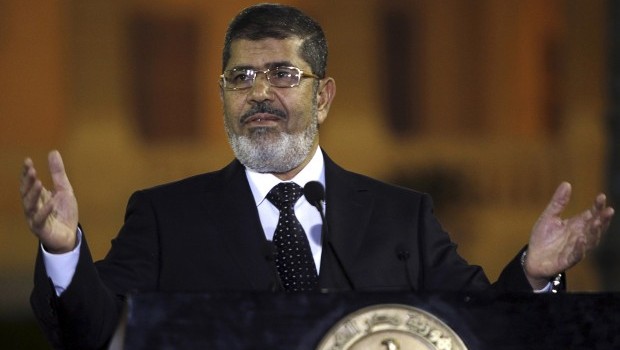Friday prayers at the Sharbatli Mosque in Cairo have become an interesting weekly story. Journalists lurk in wait for President Mohammed Mursi as he attends prayers in his local mosque. Last Friday, most newspapers focused on the worshipers’ complaints about enhanced security checks given the president’s attendance, but the real story was in fact what the imam said, which seemed to pass by unnoticed.
One worshiper told a journalist that he had refused to be searched before entering the mosque, to which a security officer replied: Go and pray elsewhere. Another man complained that these heightened security measures meant that president’s reign was a far cry from that of Caliph Umar bin Al-Khattab, who was known to have ruled with a strong sense of justice. Of course, we cannot deny the danger of threats surrounding the president. Security is a necessity despite the severity of its measures, and mosques are no longer safe houses. We should not forget that Caliph Umar, peace be upon him, was reportedly betrayed and assassinated in his mosque.
During Friday prayers it is normal for the president to bow his head like all other worshipers and listen to the imam’s sermon inconspicuously. However, on this occasion it seems that the imam would not have said what he said if he did not know the president was sitting in front of him. In fact, Mursi always frequents the same mosque and listens to the same imam. As a result, Friday sermons in Sharbatli Mosque are not like they were before; repetitive religious and moral teachings, as imams have now begun to discuss political, economic and municipal issues, even responding to what has been broadcast on television or posted on Twitter and Facebook.
The imam’s sermon was full of political remarks directed towards the worshiper siting at the front; the president. He called on Mursi to rein in the media, which, as we know, has become a hot topic in both religious and political circles. Most of the imam’s stances were to be expected, siding in support of the president, but he adopted a strange and extremist tone when he warned the worshipers in front of him that religious convergence and rapprochement was a bad idea. Had an imam in a mosque in Riyadh or Benghazi said that, it would not have been appropriate but at least understandable in a community where all citizens follow the same religion. But Egypt has always been, and still is, a multi-religious country where people of mixed beliefs have co-existed for 7,000 years. Let us not forget that the prophet, peace be upon him, married a Christian from Egypt. So how can the imam give such strange advice in the presence of the president, particularly as the latter is the leader of all Egyptians, including about 10 million Copts, which is twice the population of the whole of neighboring Libya? The Copts have a significant role to play in developing Egypt and its Arab culture, and this is indisputable.
We cannot blame the imam if he does not know much about the world outside his mosque’s walls, and we cannot blame President Mursi for what the imam said. After all, the sermon was delivered in God’s house and not the presidential palace in Heliopolis. However, we should be aware of the danger stemming from certain mosque pulpits towards our religiously diverse communities, as religious co-existence is a necessity, not a cultural luxury. Unfortunately, certain mosque pulpits now reflect the culture of the imam and his personal reading of events, rather than the morals and teachings of Islam. A culture of hatred cannot be promoted simply by the man on the street or a shopkeeper, but it can be entrenched by a university professor or a mosque imam. It begins when an influential religious figure, who should be aware of the gravity of what he says, talks about concepts that have no place in Islamic history and are purely intended to incite strife.
Imams and sermons such as these are time bombs that could lead to a civil war. Hatred transforms from mere opinions into dangerous political actions when it is fostered in mosques and churches. Hostilities among Sunnis, Shiites, Alawites and Christians led to the division of Sudan and the dispersal of Lebanon. These hostilities now threaten Iraq and Syria and even the small nation of Bahrain. It is difficult to change the convictions of the people when they are listening to a man who speaks in the name of religion.
